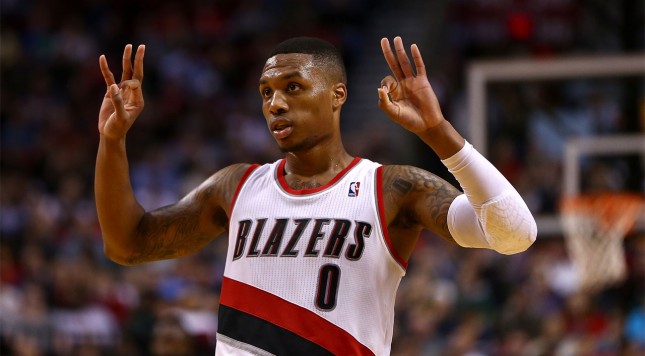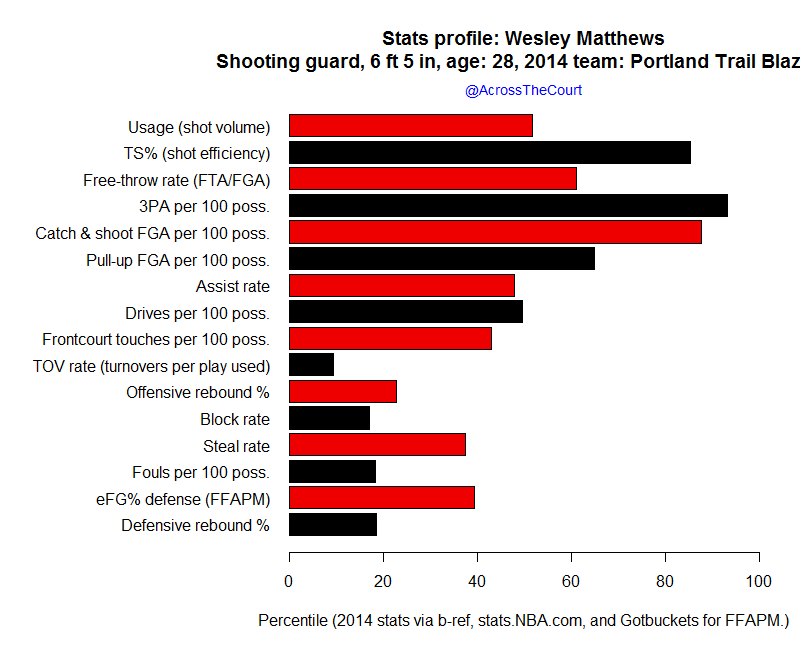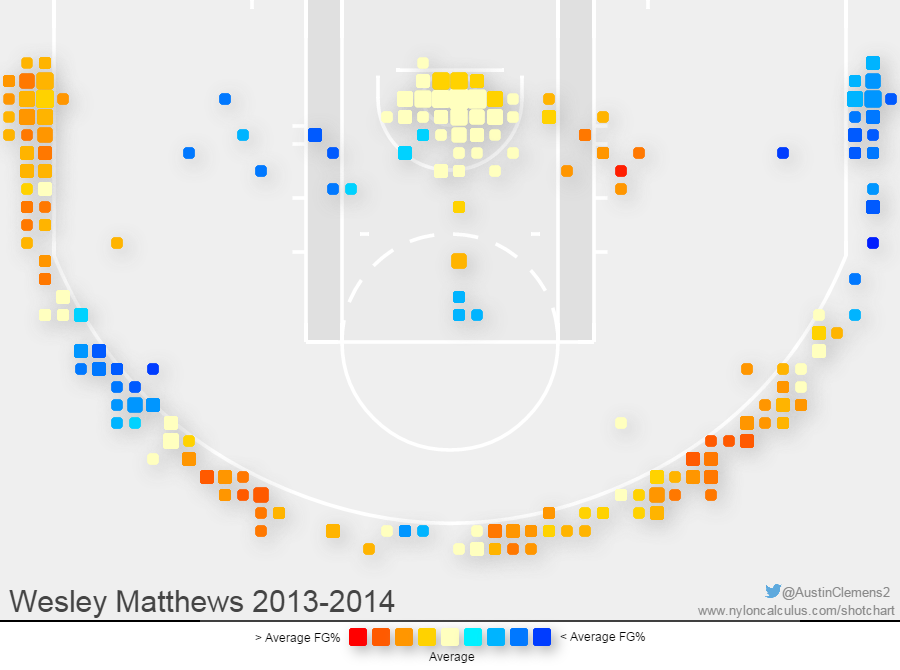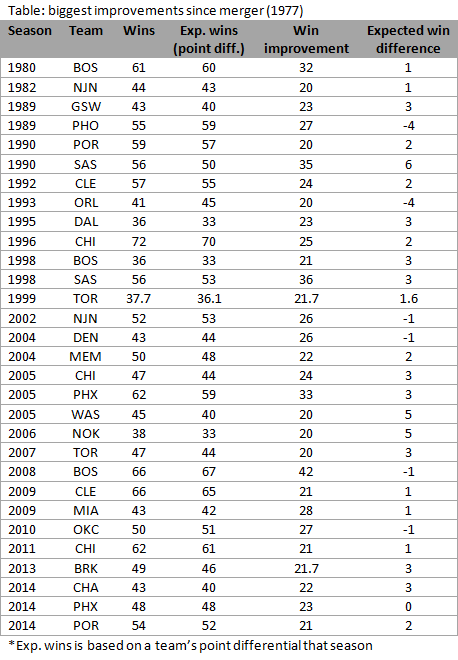After years of toiling through a Jail Blazer era and the collapse of the Brandon Roy-Greg Oden team, Portland broke through with a trip to the second round thanks to an all-star season from Damian Lillard and a starting lineup that clicked immediately. Forgotten was Portland’s rich history with the sixth best winning percentage among active franchises and a 21 year streak of making the playoffs. With LaMarcus Aldridge’s contract coming off the books soon and a taste of success, where will they go now?
2014 in review
The Blazers had few changes this year as well, changing starting centers from J.J. Hickson to Robin Lopez. Hickson averaged a double-double and shot well from the field, but he was too small for a center and was known for stealing rebounds instead of staying in correct position on defense and boxing out. The Blazers the year before didn’t seem like a bad team because their core was solid, but they had arguably the worst bench of all-time and Hickson was the wrong center for them. Robin Lopez, however, immediately established chemistry with the team and provided a bigger body to throw at centers, boxed out for Aldridge who set a career high on defensive rebounds, and set screens and crashed the boards on offense. With Lillard reaching all-star status and an okay bench, they stormed the league in the first half, putting up historic offensive numbers with a deadly combination of few turnovers and a high number of offensive rebounds, giving them a large number of plays to work with.
The team cooled off in the second half, but they still put up the second best offensive rating in the league, per basketball-reference. Since they had one of the largest year-to-year improvements after small changes, people were skeptical about how good they were, but they proved themselves in the series against Houston, a team with the exact same record. The two teams matched-up evenly, but Portland walked away with an incredible victory at the last second and reached the second round for the first time since 2000. They were destroyed by the Spurs in five games, but so were the returning champions.
Changes
Exit: Mo Williams, Earl Watson.
Enter: Chris Kaman, Steve Blake, Darius Morris.
Yes, that’s pretty much it. The Blazers swapped their backup point guard with someone else, and added a backup center. Both Watson and Morris are deep bench guards. And as odd as it sounds now, two of those guys above were all-stars.
Player spotlight
Touted as a role player, Wesley Matthews is actually a pretty well-rounded player on offense. He has a near average usage rate with very good efficiency and few turnovers. He’s a high volume three-point shooter with a large number of catch-and-shoot jumpers, but he also gets to the line at an above average rate and drives pretty well for an outside shooter. Finally, he pulls-up for a few jumpers too, and assists on a healthy amount of his teammates’ field goals. Those numbers have held up for most of his career; he’s a pretty aggressive shooting guard for someone who’s not a primary or secondary scoring option.
On defense, Matthews has a good reputation, but most numbers do not back this up. One issue is that his steals dropped when Portland installed an extremely conservative defense. Typically in other seasons, his ability to force turnovers has been a strength. He wasn’t blocking shots or rebounding, but he keeps his fouls low.
Wesley’s short chart is pretty normal for a modern shooting guard. He’s always been a good outside shooter and last season his three-point percentage nearly matched his career average. He’s been consistently hot from the left corner and from the middle section of the top of the three-point line. He’s usually a pretty good finisher, but shot charts miss his foul-drawing capabilities inside.
Matthews is a perfect fit for their offense. For an example, there’s a playlist below versus the Spurs and their great defense. The first video has Matthews hitting a three using a sneaky play where he gives the ball up and runs back to the other wing as Aldridge sets a pick on his man. It’s all done too quickly for the Spurs to react. In the second video, he catches the ball a few feet away from the basket and drives and curls around their defense, including Duncan, for a layup. He has a similar action in the third video but uses a floater to hit the shot; from his shot chart above you can see he is a little active in this area. And again in the fourth video, he drives through the twin trees of Duncan and Splitter for a basket inside. He’s a good blend of outside shooting and slashing. In the last video, with Danny Green draped all over him and with a hand in his face, Wesley drains a pull-up midrange shot. He’s not shy in taking jump shots with a hand in his face, which helps him with his three-point volume. (He was fifth overall, ahead of Durant, in total three’s made.)
Wesley Matthews has a reputation as a tough, dogged defender for a good reason. Kyle Korver was working on an impossible streak of 127 straight games with a three-pointer, but it ended in Portland against Matthews. I included all his field goal attempts below (link’s also here) where Matthews guarded all but one shot. In the first video, he chases Korver around the three-point line before funneling him into the baseline and right into Lopez at the rim. In the second video, he scares him off his first spot and then contests his three-point attempt well, which of course is missed. He chases him off the line again in the third clip and forces him into a lower percentage fallaway two-pointer. Wes wasn’t on the court in the fourth video, and it shows: Korver got a wide-open three. The fifth and sixth videos are two more examples of him running Korver off the line and taking midrange shots. In the seventh, Korver shoots quickly in transition but Matthews is right there with a hand in his face. A nice screen is set in the eighth video, but Wesley fights through and, inevitably, contests the shot. The ninth video is his worst defensive play because he loses Korver for a split second, but he recovers and closes out hard.
The Blazers excelled because their starting lineup played so well together. Matthews is a great fit for them raining in three-pointers for the best outside shooting backcourt duo outside of Curry and Thompson. Defensively, he’s not the best in the league, but he’s persistent and takes a lot of their tough assignments. Batum is often cited as their third best player, but Matthews has the stronger argument with his aggression on both ends of the court.
2015 projected
Most preseason predictions have the Blazers with five or so fewer wins including several lines from Vegas and major sites like ESPN. What’s strange about this is that Portland had very little roster turnover and their core is still pretty young.
There’s this notion that Portland overachieved in the first half and they showed their “true” colors in the second half, but there’s no evidence to support this theory. If you want to know how good at team is, barring a major change from one half of the season to the other like an injury or trade, use the team’s full season; don’t subjectively pick-and-choose whatever you want that supports a conclusion you already made.
Portland famously had four starters who played all 82 games, a welcome departure from their Brandon Roy-era. Critics insist this is why they’ll regress, but they picked healthy starters and have a revamped training staff. Matthews has only had one season where he missed games, Lopez didn’t miss a game the season before, Lillard didn’t either, and Batum usually plays big minutes. Aldridge, their most important player, usually misses fewer games. Meanwhile, CJ McCollum was supposed to supply scoring off the bench, but he was coming off a foot surgery and played a mere 38 games. In my projection, I reduced the minutes of every starter but Aldridge, who only received a tiny bump in playing time. But their youth and the bench make up for this change.
I assume few are impressed by Chris Kaman, but Portland used a low risk defense where they implored opposing players to use the low-post and gave little help there. This is okay for Robin Lopez, a huge guy, but not Joel Freeland or the disappointing Meyers Leonard. And then there’s undersized power forward Thomas Robinson. For all of the Kaveman’s faults, he’s still a plus on defense at the very least due to size and rebounding. LA defended at a league average rate when Kaman was on the court, and they were horrific without him. He also had one of the best rim protection numbers, up there with guys like Hibbert, although that’s in limited minutes. But every semi-dependable metric I looked at over the past couple seasons says that he’s still an above average defender and is at least better than Freeland.
Dorell Wright was supposed to be a useful minutes-eater on the bench, taking the stray minutes at both forward slots. But he had his poor three-point shooting season since he started taking them in Miami. With wings like him, you look at his historic numbers. He’s only 28 years-old; he’ll recover and will likely be better. McCollum has looked better in preseason and due to age and how injury-plagued his rookie season was it’s also likely he’ll improve. The bench is full of young guys in general: Robinson, Barton, Claver, and Crabbe are young enough to make significant improvements and there’s a chance one of those guys turned into a real, quality rotation piece.
Steve Blake coming in for Mo Williams is a win too. Mo Williams was a terrible defender, and he was the wrong backcourt mate for Lillard in that regard. Mo Williams won over no one in Utah, and Portland is dumping him after one year. How’s this a downgrade? Blake will be a typical backup point guard, nothing more, at a position where McCollum could eat more playing time and Lillard will probably lead the team in minutes anyway.
So what you have, pretty clearly, is a young-ish core with one more year of experience with a slightly better bench and better defenders at the backup PG and C positions canceled out somewhat by what should be fewer minutes for a starting lineup with a clean track record of health. Remember, you are not “due” for injuries; injuries lead to more injuries, not good health.
One term thrown around in downplaying the team is the “Plexiglass principle,” where a team that leaps the standings by at least 20 wins will on average come back down by 1 win. But one fewer win would put them at 53, not the 49 or 50 commonly cited, and one reason for the Plexiglass principle is that a team 20 wins better is more likely to outperform the wins its point differential would suggest. But there was nothing crazy here like Minnesota winning 8 fewer games than their point differential suggested. Portland won just two more games than expected, and their style lends itself well to winning close games, meaning that probably wasn’t a fluke.
Looking at every team with a jump in 20 wins, adjusting for shortened lockout seasons, most teams outperformed their expected win record based on point differential. Generally, point differential is a better indicator of how strong a team is and teams who outperform this measure usually fall back to earth. It was noted that teams who win 20 more games than expected drop by an average of 1 win the next season. Yet that’s less than the difference you’d predict give that the teams also outperformed their point differential by 1.6 wins. And since I base my predictions on a change in a team strength rating, not pure wins, it was not an issue with my projection.
Summary
A young core with good health gets slightly better on the bench and wins about the same amount of games as they did last season — nothing crazy here. Portland’s coming in with an extremely similar team, but that formula worked last season. They were pretty disappointing on defense last year and have some easier ground to make up there, like Lillard’s flaws in navigating screens and the nuances of defending NBA plays. And if there’s a core I can count on being healthy, it’s not the Warriors or the Wizards or most anyone else; it’s Portland, thankfully after years of torment, and they have a real chance at homecourt advantage in the first round.
Wins: 53
Losses: 29
Conference rank: 4th (tied)
League offense rank: 5th
League defense rank: 14th























